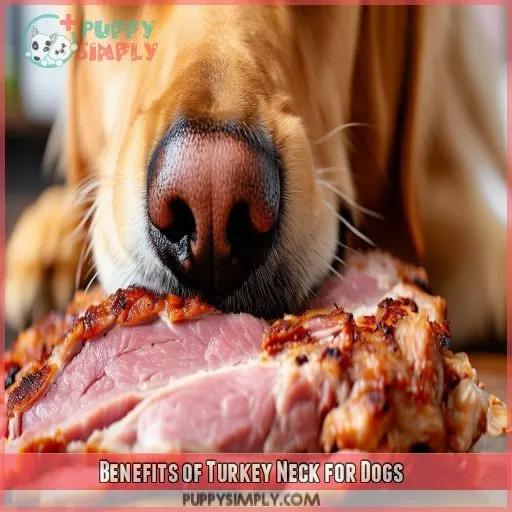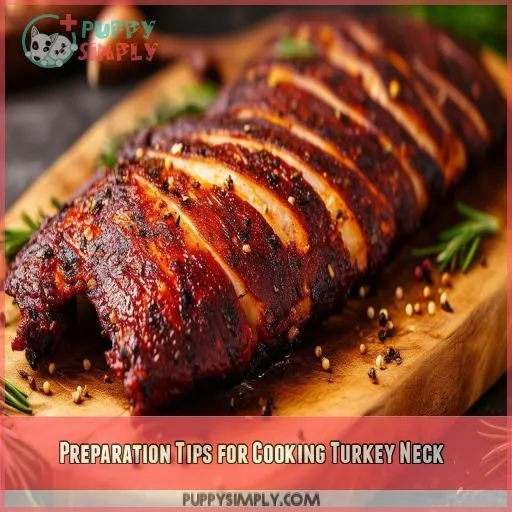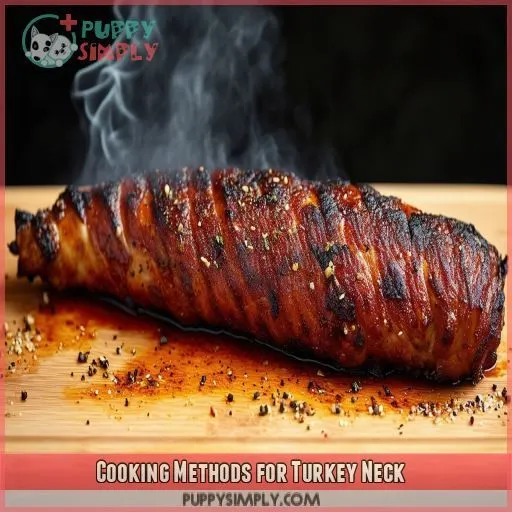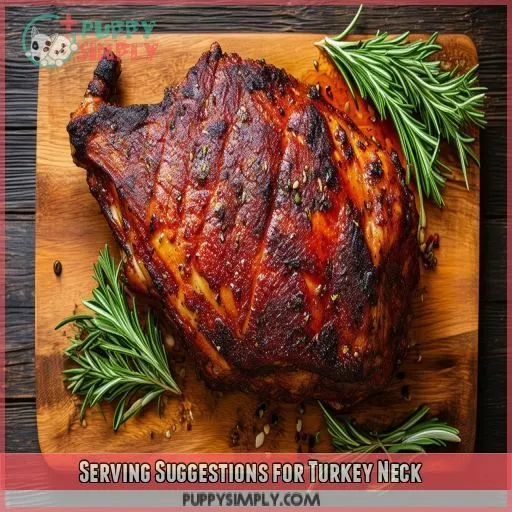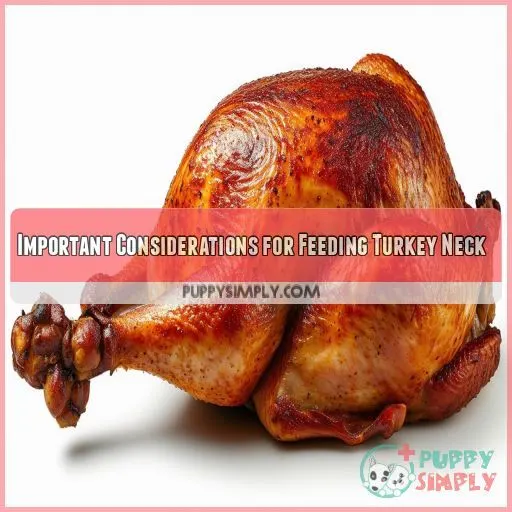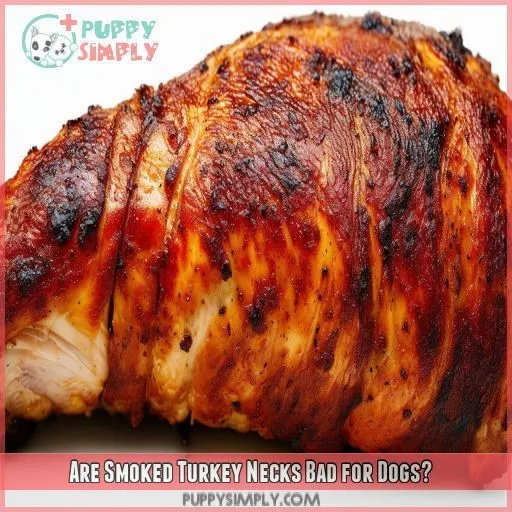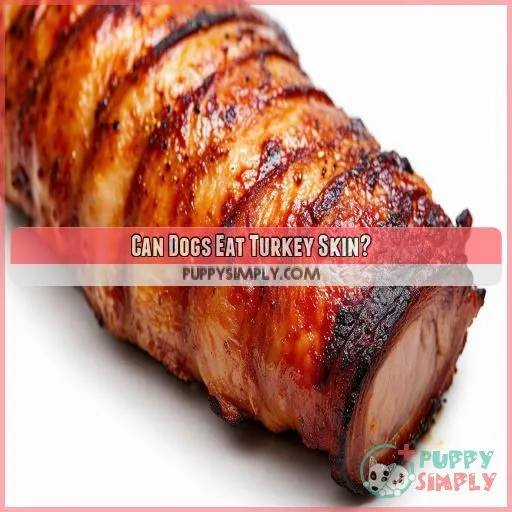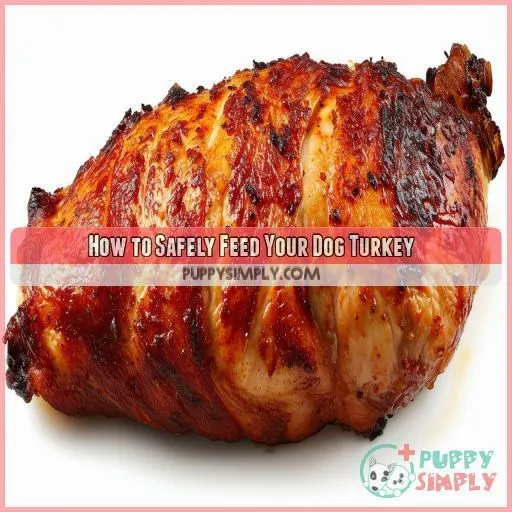This site is supported by our readers. We may earn a commission, at no cost to you, if you purchase through links.
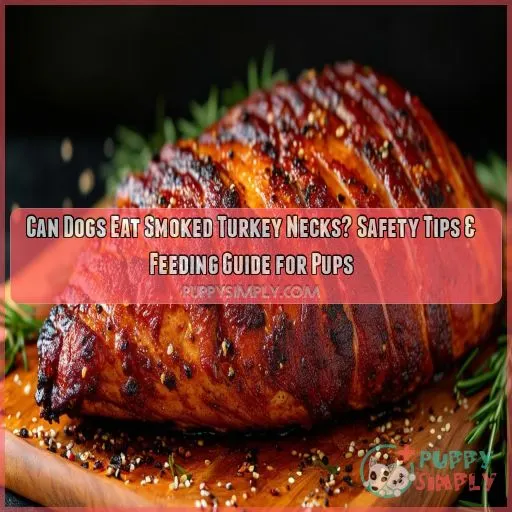
Even though the neck part of a turkey is full of lean protein and great for joint health, there are some dangers associated with the processing of the smoked variety.
In this detailed guide, we will discuss benefits, cooking methods, serving suggestions, and safety considerations to help you make a wise decision about letting your pooch participate in the celebration by indulging in this treat.
You will want to know how to ensure your pup can inhale their turkey neck sans hazard.
Read on for complete evidence-based guidance
Table Of Contents
- Key Takeaways
- Can Dogs Eat Smoked Turkey Necks?
- Benefits of Turkey Neck for Dogs
- Preparation Tips for Cooking Turkey Neck
- Cooking Methods for Turkey Neck
- Serving Suggestions for Turkey Neck
- Important Considerations for Feeding Turkey Neck
- Are Smoked Turkey Necks Bad for Dogs?
- Can Dogs Eat Raw Turkey Necks?
- Can Dogs Eat Turkey Skin?
- How to Safely Feed Your Dog Turkey
- Frequently Asked Questions (FAQs)
- Are smoked turkey necks ok for dogs?
- Can my dog eat smoked turkey bones?
- Can dogs eat smoked neck bone meat?
- Are smoked turkey necks good to eat?
- Are smoked turkey necks bad for dogs?
- Can dogs eat raw turkey necks?
- Can you give a dog smoked turkey?
- Can dogs eat turkey skin?
- What alternatives are there to smoked turkey necks?
- How often can dogs eat turkey necks?
- Can puppies safely chew on turkey necks?
- Are dehydrated turkey necks safe for dogs?
- What are signs of turkey neck allergies in dogs?
- Conclusion
Key Takeaways
- Smoked turkey necks are a big no-no for dogs. They’re like landmines for their tummies and can cause nasty cuts and bruises on the inside.
- If you want to give your pup a taste of turkey, stick to plain, cooked turkey meat without bones. It’s like giving them a safe and delicious treat without the risks.
- Raw turkey necks can be a healthy treat for older dogs, but keep an eye on them to make sure they don’t choke. It’s like giving your toddler a lollipop – you want to make sure they don’t swallow it whole!
- If you’re looking for a safer alternative to smoked turkey necks, try raw chicken necks or feet. They’re like the healthy version of doggy treats, packed with nutrients and without the risks
Can Dogs Eat Smoked Turkey Necks?
Smoked turkey necks do NOT make good food for your fur baby. While they may taste good, there are increased health risks with this treat for your dog.
Smoking changes the structure of the bone, making it more liable to splinter and causing severe internal organ injuries. Moreover, the large amount of salt added to smoked meats brings along dehydration and its troublesome train of other associated health problems.
Size matters, too—the turkey neck can be a choking hazard, especially for smaller breeds.
If you’re dead set on giving your pup a taste of the ‘bird,’ plain, cooked turkey meat without bones would be a safer alternative. But always maintain safety for your dog above all else.
You should consult with your vet about any treatment if there’s ever a question regarding its safety. They can give you specific advice for the size, breed, and health status of your dog in keeping that pooch happy and healthy
Benefits of Turkey Neck for Dogs
Turkey necks offer several nutritional benefits for your dog, including lean protein for muscle growth, glucosamine and chondroitin for joint health, and calcium and phosphorus for strong bones and teeth. They’re also a good source of vitamins B3 and B6, which support your dog’s nervous system, and provide essential amino acids for overall health
Rich in Lean Protein
Turkey necks offer your dog a lean protein boost. They’re packed with nutrients that support muscle growth, but be mindful of potential protein allergies or digestion issues
Joint Health
Turkey necks pack a punch for joint health. They’re loaded with glucosamine and chondroitin, which support cartilage and can help manage arthritis in your furry friend
Strong Bones and Teeth
Turkey necks aren’t just great for joints. They’re packed with calcium and phosphorus, boosting your pup’s bone development and dental health. Cooked turkey necks offer these benefits safely
Nervous System Support
Turkey necks support your dog’s nervous system with essential nutrients. They’re a natural dietary supplement, providing:
- Vitamin B3 for nerve function
- Vitamin B6 for neurotransmitter production
- Niacin for brain health
- Thiamine for cognitive function
- Riboflavin for nerve cell maintenance
Essential Amino Acids
Turkey necks offer essential amino acids your dog’s body can’t produce. These protein building blocks support joint health and lean muscle development. Cook without seasonings for optimal benefits
Preparation Tips for Cooking Turkey Neck
To prepare the turkey necks, always source your fresh necks from a reputable supplier and clean them well to eliminate rubbish and blood. Use appropriate portion sizes or trim down where necessary to suit your dog’s size, then trim off some excess fat or skin before cooking for a healthier treat.
Choosing Fresh Turkey Necks
When selecting turkey necks for your pup, opt for quality. Here’s what to look for:
- Organic or non-GMO options
- Free-range or pasture-raised sources
- Fresh, not frozen, necks
- Consultation with your vet for safety
Removing Debris and Blood
Before cooking, rinse turkey necks thoroughly under cool water. This removes debris and blood, ensuring safe consumption for your pup. Be thorough, as smoked necks may contain excess sodium and preservatives
Adjusting Portion Size
After rinsing, adjust the turkey neck portion size based on your dog’s weight. Consider health implications and dietary restrictions. Smaller dogs need less, while larger breeds can handle more. Supervise feeding to prevent gastrointestinal blockage
Removing Excess Fat and Skin
Before cooking, trim excess fat and remove the skin from turkey necks. While skin contains some nutrition, it’s high in fat. Prioritize your dog’s dietary needs by focusing on the lean meat for healthier treats
Cooking Methods for Turkey Neck
If you’re doing turkey necks for your dog, there are several ways you can cook the neck. You could boil the neck in water for approximately 30 minutes or grill it over medium heat for 20-30 minutes. Alternatively, bake them in the oven at 350°F for 45-60 minutes.
Boiling
After prepping your turkey necks, boiling’s a safe bet. Cover them with water in a pot and bring to a boil. Simmer for 30 minutes or until tender. This method’s great for dogs with health conditions, as it’s gentle on their nervous system
Grilling
If you like to grill, begin by heating your grill over medium heat. Place the turkey necks on the grates and cook for 20-30 minutes, turning them periodically. Use tongs for safety and ensure browning and an internal temperature of 165°F with a meat thermometer.
Baking
Preheat your oven to 350°F. Place the turkey necks on a baking sheet; no additional ingredients are necessary. Cook for 45-60 minutes until they’re well-cooked all the way through. This simple bake will ensure that your fur baby’s treat is safe and deliciously well done. Be sure not to let it overbake!
Serving Suggestions for Turkey Neck
You can serve turkey necks to your dog as a standalone treat or chop them up and mix them into regular meals for added flavor and nutrition. Always monitor your dog while they’re eating turkey necks to prevent choking, and consider any health conditions or dietary restrictions before incorporating them into your pup’s diet
Standalone Treat
After cooking, you can serve turkey necks as standalone treats. Be cautious of splintering risk and bacterial contamination. Use a food dehydrator for safer, dehydrated bones. This helps prevent gulping and promotes mindful eating
Mixing Into Meals
You can mix chopped turkey neck into your dog’s regular meals for added flavor and nutrition. Start with small serving amounts, gradually increasing. Consider using bone broth or dehydrated turkey for variety
Monitoring for Choking
When adding turkey neck to your dog’s meal, stay vigilant. Watch for choking hazards, especially with larger bone sizes. Supervise eating closely to prevent digestion issues and promote dental health
Health Conditions and Restrictions
While monitoring for choking, consider your dog’s health issues and dietary needs. When serving turkey necks:
- Consult your vet about nutritional value
- Adjust serving frequency for digestion concerns
- Monitor for allergic reactions
- Avoid overfeeding to prevent weight gain
Important Considerations for Feeding Turkey Neck
Constantly monitor your dog when giving them turkey necks so that they don’t choke on more significant pieces, and consult your vet regarding health conditions or dietary restrictions. Further, never feed raw turkey necks because they can contain bacteria. Be sure to cook them properly to eliminate any possible health hazards.
Supervising Eating
As you feed your dog the necks of turkeys, keep a close eye on them. Encourage good and safe chewing habits; therefore, avoid gulping. Hang on to more significant pieces with patience. This helps keep away choking hazards and makes for a positive feeding experience with your pup.
Consulting a Veterinarian
Now, when you’re taking the time required to supervise your pup, don’t forget to consult with your vet before serving up those turkey necks. They’ll give you customized advice on:
- Portion size
- Potential bone hazards
- Alternatives for dogs with specific health needs
Avoiding Raw Turkey Neck
Do not give your dog raw turkey necks because they contain some harmful bacteria that may get to his health. Furthermore, raw bones have the chance of splitting and harming them internally. The cooking option is safe for your pup.
Cooking Thoroughly
Always cook turkey necks thoroughly before serving to your dog. Use safe cooking methods like boiling or baking, and adjust portion size based on your pup’s needs. Monitor for choking hazards and consider health factors
Are Smoked Turkey Necks Bad for Dogs?
While turkey necks do have their share of health benefits, their smoked form does pose some potential dangers to your furry friend. In smoking, the bone structure changes, which makes it easier for them to shatter inside your dog and cause nasty internal injuries. The smoke alone may also contain a few toxic elements that can negatively affect a dog’s health. This should help weigh the smoked bone concerns against some of the possible benefits when smoked turkey necks are being considered.
Instead, opt for raw bones or dehydrated treats—these are far safer than the smoked version. Dehydrate turkey necks at home and cut them up into portions according to your dog’s weight. This way, all the nutrients are preserved without adding those harmful smoke-related compounds.
Can Dogs Eat Raw Turkey Necks?
While raw turkey necks can make for a healthy treat in older dogs, they certainly don’t work for all of them. A raw turkey neck contains many nutritional elements and helps clean the teeth, but one has to remember the size and age of your dog.
They’re also too big and have stiff vertebrae that can be a significant choking hazard for puppies. You may want to start with the "beginner" size, such as chicken necks, and progress in size as your pup gets more extensive.
Always supervise your dog for intake when feeding raw meats so that gulping doesn’t occur, which can result in digestion problems. Fresh turkey necks should be acquired from a reputable supplier.
This is to ensure reduced possibilities of bacterial contamination. If you’re concerned about adding directly raw turkey necks into your dog’s diet, consult with your vet for advice specific to your furry friend’s needs
Can Dogs Eat Turkey Skin?
Feeding your dog the skin of a turkey could be considered a bit of a tricky call. On one hand, it’s packed with flavor; on the other, it’s full of fat that might upset stomachs or even cause pancreatitis.
Moreover, a dog has to eat turkeys in a balanced manner, and the skin simply doesn’t provide the best nutritional value for them. If you’ll give them some, then do so very sparingly. Be sure there are no seasonings or bones in the skin and that it doesn’t contain extreme amounts of fat, as all these things can be pretty pernicious to an animal’s health.
Keep it minimal because it’s a portion guideline-suggestive. In other words, it’s more of an occasional treat than one integral for a meal component. Monitor your dog with the new addition of foods at all times so that any adverse reaction gets captured on time. Small portions and careful observation will keep your pup safe
How to Safely Feed Your Dog Turkey
You want to feed your dog with safety regarding the turkey meat. Always cook the turkey well to prevent bacterial attacks. Removing bones ahead of time can help avoid any choking risks. Ensure the turkey has no seasonings or other constituents since these additions can cause stomach upsets in dogs. Plain, freshly baked turkey can be a surprising treat for your canine friend.
Chop up the turkey into small, manageable portions to avoid choking.
- Supervise your dog’s eating to ensure that they chew their food correctly and not gulp it.
- Consult your veterinarian if your dog has any dietary restrictions or health conditions before adding turkey to their diet.
Frequently Asked Questions (FAQs)
Are smoked turkey necks ok for dogs?
Imagine your dog wagging his tail, wanting the treat. On the other hand, smoked turkey necks aren’t that safe for dogs in terms of having digestion problems from the bones and choking hazards. You can instead feed raw chicken necks or feet, which are relatively safer.
Can my dog eat smoked turkey bones?
No, don’t feed your dog the smoked turkey bones. Smoked bones are cooked, thus brittle, and can splinter down to sharp points easily, which may bring about potential choking or digestive blockages. Opt for raw bones instead; they’re safe.
Can dogs eat smoked neck bone meat?
It’s best to steer clear of the neck bone meat, especially the smoked one. Your dog might’ve digestive issues and even upset stomachs from these. Keep them away to avoid such problems and ensure their safety and well-being.
Are smoked turkey necks good to eat?
No, smoked turkey necks aren’t ideal for dogs. They can cause digestive issues and splintering, posing a choking hazard. It’s better to offer raw turkey necks, especially for larger dogs, while small dogs should have chicken necks
Are smoked turkey necks bad for dogs?
Just like diving headfirst into the unknown, giving smoked turkey necks to dogs can be risky. They may cause digestive issues or splintering, posing choking hazards. Stick to raw or properly cooked unseasoned turkey necks for safety
Can dogs eat raw turkey necks?
Yes, older dogs can eat raw turkey necks. They provide lean protein, glucosamine, and chondroitin. However, always supervise your dog while eating to prevent choking and consider consulting your vet for safety
Can you give a dog smoked turkey?
No, you shouldn’t give your dog smoked turkey. It can cause digestive upset and potential hazards, as smoked bones are cooked and more likely to splinter, posing a risk of injury or choking
Can dogs eat turkey skin?
Dogs shouldn’t eat turkey skin. It’s high in fat, which can cause pancreatitis and digestive upset. Additionally, the seasoning often used can be harmful to dogs. Always remove the skin before feeding turkey to your dog
What alternatives are there to smoked turkey necks?
Ironically, smoked turkey necks aren’t recommended. Raw chicken necks or feet offer safer alternatives, packed with nutrients without the digestive risks. Dehydrated turkey or beef treats can also provide healthy, chewable options for your dog
How often can dogs eat turkey necks?
Feed your dog turkey necks once or twice a week. This frequency provides beneficial nutrients without overloading their diet. Consult your vet first, especially if your dog has specific health conditions or dietary considerations
Can puppies safely chew on turkey necks?
No, puppies shouldn’t chew on turkey necks; they’re too large and pose choking hazards, especially with vertebrae. Opt for raw chicken necks instead, starting small and gradually increasing the size as they grow
Are dehydrated turkey necks safe for dogs?
Generally speaking, dehydrated turkey necks are safe for dogs as long as they aren’t seasoned with added salt. However, always make sure that they’re dried thoroughly to avoid spoilage. Be sure to supervise your dog while eating so that you can prevent any possible choking or health issues that may occur.
What are signs of turkey neck allergies in dogs?
Watch for signs like itching, hives, swelling (especially around the face), gastrointestinal issues (vomiting, diarrhea), and ear infections. If your dog shows these symptoms after eating turkey necks, consult your vet immediately
Conclusion
Imagine your dog as a knight enjoying a feast at the round table. When considering smoked turkey necks, safety is paramount.
They offer lean protein and joint health benefits but can pose hazards if not prepared correctly. Always cook thoroughly and consult your vet.
Avoid raw or processed varieties to keep your pup safe. With these guidelines, you can confidently decide if smoked turkey necks are suitable for your furry friend, ensuring their celebratory treat is both delightful and safe

